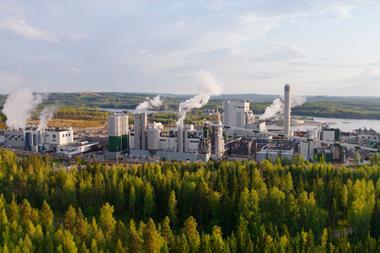In August, Associated British Foods (ABF) announced the closure of Vivergo, its bioethanol production plant in Hull, UK. The decision to close the site, one of just two bioethanol plants in the UK, followed failed discussions with the UK government to find a solution to enable Vivergo to operate on a profitable and sustainable basis.

The closure leaves Ensus’s Teesside plant, owned by German company CropEnergies, as the sole major producer of bioethanol in the country, although it too has warned that it might be forced to close unless the UK government takes urgent action.
The news continues something of a trend for the biofuel sector. In July, Greenergy, owned by oil and metals trading group Trafigura, began consultation on proposals to permanently close its biodiesel plant in Immingham, north-east Lincolnshire, due to poor market conditions and uncertainty about UK biofuels policy. And last year, European biodiesel producer Argent Energy mothballed its plant in Motherwell, Scotland.
Argent Energy said that there were a number of external conditions that had ‘substantially weakened’ the environment for European and UK biodiesel production including unprecedented competition from imported Chinese biodiesel and renewable diesel from the US, the UK exempting major fuel suppliers from tariffs on competing diesel imports, and difficulties in sourcing Argent’s main tallow feedstock from the EU following Brexit.
However, for bioethanol plants, the biggest blow came in June when the UK prime minister, Keir Starmer, agreed a 1.4 billion-litre tariff-free import quota for US ethanol as part of a deal with US president Donald Trump; approximately equivalent to the UK’s entire annual demand for bioethanol. Responding to the news, the heads of ABF and Ensus warned that the British bioethanol industry could collapse completely.
Despite these warnings, the UK government rejected a bailout for the sector after deciding that it was not in the national interest to provide them with taxpayer funds.
‘This government will always take decisions in the national interest,’ a spokesperson for the UK department of business and trade told Chemistry World. ‘That’s why we negotiated a landmark deal with the US which protected hundreds of thousands of jobs in sectors like auto and aerospace,’ they added.
‘We have worked closely with the companies since June to understand the financial challenges they have faced over the past decade, and have taken the difficult decision not to offer direct funding as it would not provide value for the taxpayer or solve the long-term problems the industry faces.’
Ensus, whose Teesside plant uses more than a million tonnes of wheat each year to make up to 400 million litres of bioethanol to go into petrol, is in ongoing talks with the UK government to find a way to keep the UK facility operating.
As well as bioethanol, the plant also produces two important by-products: 350,000 tonnes of high protein animal feed and up to 250,000 tonnes of biogenic CO2, which mostly goes to the food and drinks industry, and is ‘a product of critical national importance’ according to Grant Pearson Chairman of Ensus UK.

On 15 August, Pearson said the government was looking at options to secure an ongoing supply of CO2 from the Teesside facility. ‘This is positive news, however it is likely to take time to agree upon and finalise,’ he said. The company would therefore need to work hard to reassure its European owners that ‘an acceptable long-term arrangement can be reached’.
Renewable fuels growth
The biofuel industry in the UK has been growing over the past two decades following the launch of UK government’s Renewable Transport Fuel Obligation (RFTO) in 2008. The aim of the RFTO is to reduce greenhouse gas emissions from transport by encouraging supplies of renewable fuels. It requires UK fuel suppliers to meet a rising annual quota of sustainable fuel – which includes biofuels like biodiesel and bioethanol, synthetic e-fuels and novel low carbon fuels such as hydrogen – and provides a valuable incentive for the renewable transport fuel industry which contributes towards meeting this obligation.
When the RFTO was first launched the percentage of road transport fuel that was required to be low carbon or renewable was 2.5%, rising to over 12% in 2025, and further to 14–17% by 2032, after which the targets remain flat.
However, as Patricia Thornley, director of the Energy and Bioproducts Research Institute at Aston University, UK, points out, the RFTO does not make a distinction about where that low carbon fuel has to come. This prioritises the lowest cost fuels, most of which come from overseas.
‘Countries like America, where they have masses of corn production, and they can get really good yields because it’s sunny and they’ve got big agricultural machinery and huge fields and lots of land … can produce the ethanol more cheaply than in the UK [where] our yields are lower and the size of the facilities are smaller,’ explains Thornley.
Further compounding this, the US–UK trade deal, signed earlier this year, included a concession by Keir Starmer to reduce import tariffs on US ethanol from 19% to zero as part of a wider agreement to reduce US tariffs on British exports of cars, steel, aerospace components and other products.
‘Part of the trade agreement meant that US ethanol no longer faces any tariff when it came into the UK, and that effectively results in imports being cheaper than what we can produce here,’ says Thornley.
But, while the financial incentives for continuing biofuels in the UK may be lacking, from the climate change perspective, the arguments are stronger than ever.
Climate change obligations
Under the United Nations Framework Convention on Climate Change, industrialised countries are expected to do the most to cut emissions on home ground and account for what happens within their territory. Countries get credit for the carbon they help remove from the atmosphere but are debited for the carbon they release. In the case of producing bioethanol, carbon dioxide is removed from the atmosphere by crops, such as sugarcane, corn and sugar beet, before they are converted into ethanol. This means that CO2 that is released when a vehicle uses bioethanol is CO2 that was only recently in the atmosphere; somewhat balancing out the emissions.
However, if biofuels are bought from overseas, the UK will only be debited for the CO2 emitted and receive no credit for removing carbon from the atmosphere. ‘The idea is that if the two had come from the same place – if we had used our renewable fuel to fuel our cars and it was releasing it – then it would all balance,’ says Thornley. ‘The problem is that if the crop is growing overseas, then it’s that country that gets the credit; so if Brazil grows the sugar cane [and] they produce the ethanol, then Brazil gets credited for the production, they sell it to us, and we have to take the hit for the emissions,’ she adds.
‘So, it would be better for the UK carbon accounts if we grew the stuff ourselves. And that, from a climate perspective, is the main argument for keeping those plants in the UK.’
There will also be negative economic impacts from the closure of these biofuel plants as they impact not only the jobs and livelihoods of the thousands of staff working at them, but also the farmers who are producing the feedstock crops.
As well as challenging market conditions, industry bosses have blamed insufficiently ambitious mandates on biofuel use in the UK and say that policy support is lagging.
But Thornley, who leads the largest bioenergy research group in the UK and has received UK government funding for the last 13 years to work on different ways of producing biofuels, says she does not believe the government has pulled out of its renewable fuel obligation.
‘What has changed is the external market, the fact that it’s now cheaper to get it from America than it is to do it in the UK,’ she adds. ‘What could be done to support it? If it were possible to focus on homegrown and to enable that in some way, that would make sense.’

















No comments yet